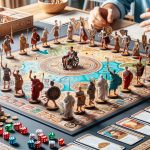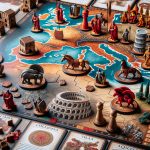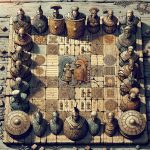The Civilization board game is a popular strategy game that allows players to build their own civilizations from ancient times to the modern era. With a focus on resource management, expansion, and diplomacy, players must navigate through different eras while competing against other civilizations for dominance. In this article, we will delve into the specific strategies employed by the Roman civilization in the game and how they are influenced by real-life Roman tactics.
The Roman civilization holds a significant place in history for its military prowess, technological advancements, and administrative abilities. Known for their disciplined armies and innovative engineering feats, the Romans built an empire that stretched across continents. These historical attributes are reflected in the gameplay of the Civilization board game, where players can experience the strategic thinking required to lead such a powerful civilization.
When playing as the Roman civilization in Civilization board game, key elements of Roman strategy come into play. From building strong infrastructure and military units to establishing trade routes and expanding territorially, players must adopt a balanced approach to succeed. The ability to leverage Rome’s unique strengths while adapting to changing circumstances is crucial in outmaneuvering opponents and securing victory on the virtual world stage.
Introduction to Roman Civilization and Its Historical Significance
The Roman civilization holds a significant place in history, known for its vast empire, military prowess, and cultural achievements. From the founding of Rome in 753 BC to the fall of the Western Roman Empire in 476 AD, Romans made lasting contributions to art, architecture, law, and government that continue to impact modern society. The Roman Empire’s expansion across Europe, Asia, and Africa shaped the course of civilization for centuries to come.
One of the key aspects that set the Roman civilization apart was its strategic military tactics and organizational structure. The Romans were renowned for their disciplined armies, innovative engineering techniques, and effective governance of conquered territories. These elements played a crucial role in their ability to establish and maintain one of the largest empires in history. Their military strategies such as formation-based combat, road network construction, and logistical planning have been studied and admired by strategists throughout the ages.
In the Civilization board game, players have the opportunity to experience the challenges and triumphs of building their own empire, much like the ancient Romans. By choosing to play as the Roman civilization in the game, players can harness these strategic elements to expand their territory, develop infrastructure, engage in diplomacy or warfare with other civilizations on their path to dominance.
The influence of Roman strategy is evident in gameplay mechanics that emphasize city-building, military conquest, cultural development, and diplomatic relations – all crucial components of successful empire management.
| Roman Civilization Contributions | Civilization Board Game Reflection |
|---|---|
| Military tactics & organization | Formation-based combat & warfare strategy |
| Engineering achievements | Infrastructure development & city-building mechanics |
| Governance & diplomacy | Diplomatic relations mechanics between civilizations |
The Influence of Roman Strategy on the Civilization Board Game
One key element of Roman strategy in the Civilization board game is its focus on expansion and conquest. Just like the Roman Empire, players must strategically expand their territories, establish cities, and manage resources to ensure growth and dominance. The game rewards players who are adept at diplomacy, trade agreements, as well as military tactics – all essential components of Roman strategy.
Furthermore, players who choose to play as the Roman civilization in the game have access to unique abilities and units that reflect Rome’s historical strengths. From formidable legions to efficient road-building skills, embodying Roman strategy allows players to leverage their strengths in military might while also excelling in infrastructure development. Mastering these elements is crucial for those seeking to dominate their opponents and lead their civilization to victory in the Civilization board game.
| Key Elements of Roman Strategy | Analysis |
|---|---|
| Focus on Expansion and Conquest | The game rewards strategic expansion just like Rome’s historical conquests. |
| Unique Abilities and Units | Roman civilization in the game has access to legions and road-building skills similar to historical Rome. |
Key Elements of Roman Strategy in Civilization Board Game
The implementation of Roman strategy in the Civilization board game brings a unique and challenging dynamic to gameplay. From military tactics to city management, the Roman civilization offers players a strategic advantage that can lead to dominance on the virtual battlefield. Here are some key elements of Roman strategy that players can utilize to achieve success in the game:
- Military Prowess: One of the defining characteristics of the Roman civilization is its military strength and discipline. In the Civilization board game, this is reflected in the ability of Roman units to wage war effectively and efficiently. Players controlling the Roman civilization have access to powerful military units such as legions, which excel in combat and conquest.
- Infrastructure Development: The Romans were known for their advanced infrastructure, including roads, aqueducts, and city planning. In the Civilization board game, players can use this aspect of Roman strategy to their advantage by focusing on building roads to connect their cities, optimizing trade routes, and strategically placing their districts for maximum efficiency.
- Diplomatic Skills: The Romans were adept diplomats who knew how to form alliances and make strategic decisions on the international stage. In the game, players can emulate this aspect of Roman strategy by forming alliances with other civilizations, negotiating favorable trade deals, and using diplomacy to further their interests without necessarily resorting to conquest.
By mastering these key elements of Roman strategy in the Civilization board game, players can enhance their gameplay experience and increase their chances of achieving victory. The unique blend of military might, infrastructure development, and diplomatic finesse makes playing as the Roman civilization a challenging yet rewarding experience for fans of strategy games.
Analysis of Gameplay Mechanics That Reflect Roman Strategy
The Civilization board game is a strategic tabletop game where players take on the role of leaders guiding their civilizations through the ages. The game involves building cities, managing resources, conducting diplomacy, and waging war. Each civilization in the game has its unique traits and abilities that influence gameplay. One of the most iconic civilizations in history, the Roman Empire, is also represented in the game with its own set of characteristics.
Roman Legion
One of the key gameplay mechanics that reflect Roman strategy in the Civilization board game is the representation of the Roman Legion. The Roman military was known for its disciplined and organized legions that conquered vast territories. In the game, playing as the Roman civilization grants players bonuses related to military strength and combat tactics. This reflects the historical importance of the Roman Legion in shaping the empire’s expansion and dominance.
Infrastructure Development
Another aspect of Roman strategy reflected in gameplay mechanics is infrastructure development. The Romans were great builders known for their roads, aqueducts, and impressive architecture. In the Civilization board game, players controlling Rome have advantages in city-building and expanding their infrastructure. This mirrors the historical legacy of Roman engineering feats that facilitated communication, trade, and overall societal development.
Diplomatic Influence
Furthermore, Roman strategy emphasized diplomacy as a means to expand influence and control over territories without engaging in direct conflict. In the Civilization board game, playing as Rome allows players to leverage diplomatic relations with other civilizations for mutual benefits. This strategic approach reflects how Rome used alliances and negotiations to maintain stability within its empire while projecting power beyond its borders. Mastering diplomatic maneuvers can be a crucial element in achieving victory as Rome in the game.
Tips and Strategies for Playing as the Roman Civilization in the Game
Playing as the Roman civilization in the Civilization board game offers a unique and rewarding experience for players. By adopting the strategic mindset of the ancient Romans, you can lead your empire to glory and domination on the virtual world map. Here are some essential tips and strategies to help you make the most out of your Roman civilization:
- Focus on Expansion: Just like the Romans did in history, expansion is key to your success in the game. Build cities, establish trade routes, and conquer neighboring territories to increase your influence and resources.
- Military Strength: The Roman civilization excels in military prowess, so make sure to prioritize building a strong army. Invest in military technologies, train powerful units, and strategically position your troops to defend your lands or launch successful conquests.
- Diplomacy and Alliances: While war might be necessary at times, don’t underestimate the power of diplomacy. Forge alliances with other civilizations, negotiate trade agreements, and use political maneuvers to gain advantages without resorting to conflict.
By mastering these tips and strategies, you can channel the strategic genius of the ancient Romans and lead your civilization to victory in the Civilization board game. Embrace Rome’s legacy of innovation, military might, and diplomatic finesse as you navigate through the challenges and opportunities presented in the game.
Comparing Roman Strategy to Other Civilizations in Civilization Board Game
When it comes to playing the Civilization board game as the Roman civilization, there are distinct strategies and playstyles that set them apart from other civilizations in the game. One of the key aspects of Roman strategy in the game is their focus on military prowess and expansion.
Compared to other civilizations, such as the Egyptians or Chinese, who may prioritize cultural development or technological advancements, Romans excel in building a strong army early on and expanding their empire through conquest.
Military Dominance
The Roman civilization in the Civilization board game is well-equipped for warfare with unique units and abilities that give them an edge on the battlefield. Their legions are formidable forces that can quickly conquer enemy territories and defend their own borders effectively. Players who choose to play as Romans must capitalize on their military strength by engaging in strategic battles and expanding aggressively to control more land and resources.
Infrastructure and Development
While military conquest is a core aspect of Roman strategy in the Civilization board game, players must also focus on developing their infrastructure and economy to support their growing empire. Building roads, aqueducts, and other essential structures can help facilitate trade, improve resource production, and support population growth. Balancing military expansion with infrastructure development is crucial for long-term success as the Roman civilization.
Diplomacy and Alliances
In addition to military might and economic development, players of the Roman civilization must also consider diplomatic relations with other civilizations in the game. Forming alliances, negotiating trade deals, or even engaging in espionage can be valuable tools for maintaining stability within your empire while keeping rival civilizations at bay. Knowing when to make strategic alliances or when to assert dominance through military action is key to mastering Roman strategy in the Civilization board game.
The Legacy of Roman Civilization in Strategy Games and the Gaming Industry
Roman civilization has left an enduring mark on the world, not just in history books but also in the realm of strategy games. The Civilization board game, with its complex gameplay and historical depth, is a prime example of how ancient civilizations like the Romans continue to influence modern entertainment. By delving into the key elements of Roman strategy, players can experience firsthand the tactical brilliance that helped build one of the greatest empires in human history.
One of the standout features of Roman civilization was its military prowess, which is reflected prominently in the Civilization board game. The strategic principles of discipline, organization, and adaptability employed by the Romans on the battlefield are seamlessly integrated into gameplay mechanics that challenge players to think critically and plan ahead.
Whether it’s deciding where to build cities for optimal defense or managing resources efficiently to support a growing empire, players must embody the same strategic mindset that allowed Rome to conquer vast territories.
Playing as the Roman civilization in Civilization board game offers a unique gaming experience that highlights both the strengths and weaknesses of this ancient powerhouse. By mastering key strategies such as road building for swift movement and diplomatic maneuvers to forge alliances, players can navigate their way to victory in a competitive world filled with rival civilizations.
The legacy of Roman civilization in strategy games like these serves as a testament to the enduring appeal of ancient history and its impact on our modern entertainment landscape.
Frequently Asked Questions
Is Civilization a Strategy Game?
Civilization is a strategy game developed by Sid Meier, where players build and expand their own civilization over time. It involves managing resources, technology, diplomacy, and military to succeed.
Is There a Civilization Board Game?
Yes, there is a Civilization board game based on the video game series. In this adaptation, players take on the roles of historical leaders aiming to develop their empires through different eras until victory conditions are met.
What Is the Best Version of Civilization Game?
The best version of the Civilization game can be subjective depending on personal preferences. Some may argue that Civilization VI offers the most updated graphics and gameplay mechanics, while others prefer the simplicity and nostalgia of earlier versions like Civilization III or IV. Ultimately, it comes down to individual taste in strategy games.

I love playing all kinds of games – from classics like Monopoly to modern favourites like Ticket to Ride.
I created this blog as a way to share my love of board games with others, and provide information on the latest releases and news in the industry.





